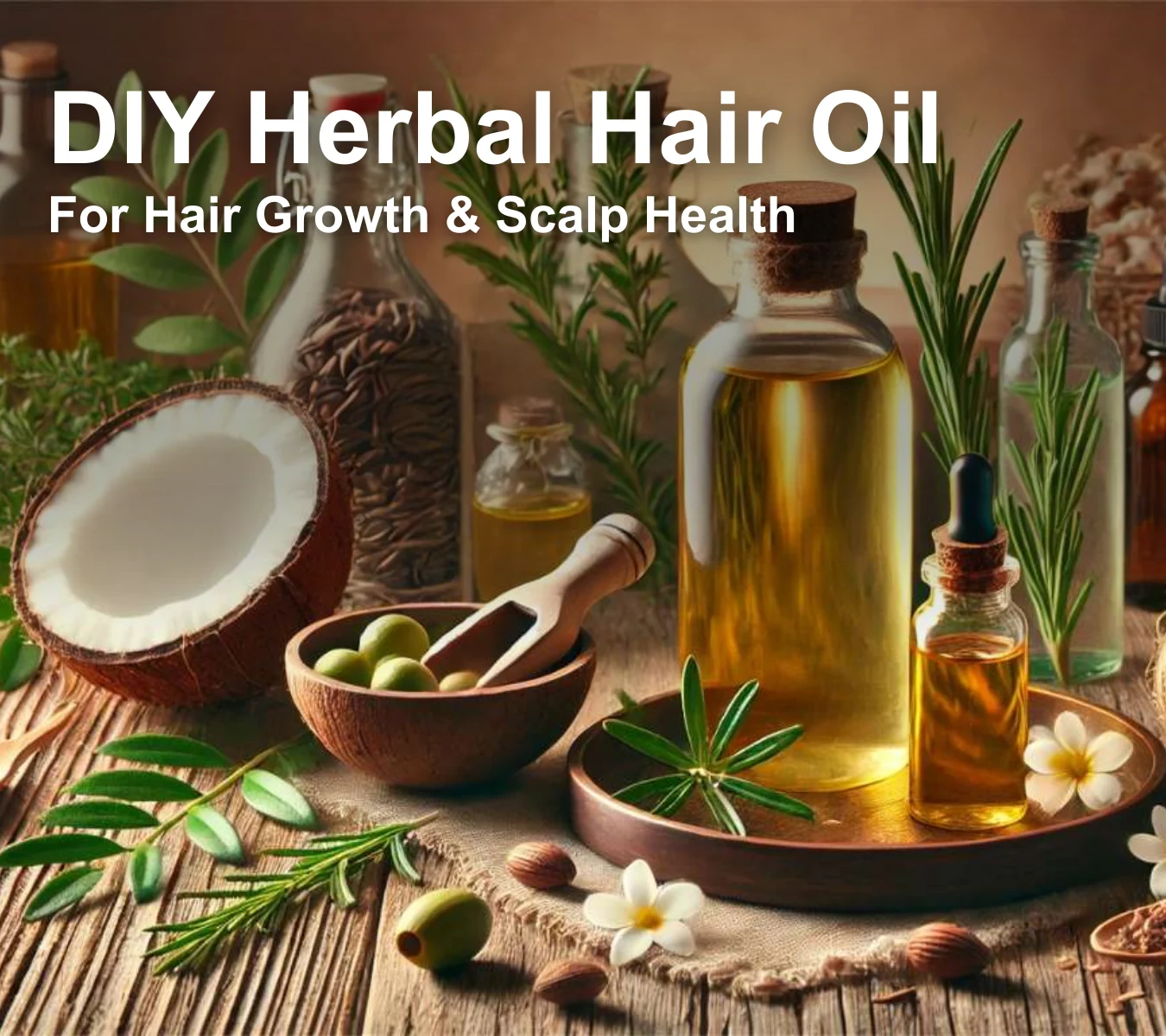DIY Herbal Hair Oil for Hair Growth Scalp Health
1️⃣ Introduction:
DIY Herbal Hair Oil for Hair Growth Scalp Health. In today’s fast-paced world, hair care often takes a backseat. But what if you could naturally improve your hair’s health with ingredients right from your kitchen? Herbal hair oils have been used for centuries in traditional medicine across the world for their nourishing and strengthening properties. These oils are packed with nutrients that promote hair growth, scalp health, and overall hair vitality.
Did you know that many essential oils contain properties that can stimulate blood circulation in the scalp and balance oil production? In this article, we’ll dive into the best herbal oils you can make at home, which are packed with the nutrients your hair craves.
2️⃣ Health Benefits:
🏵️ Promotes Hair Growth:
Herbal oils such as rosemary oil and peppermint oil have been proven to increase circulation to the scalp. This better circulation encourages hair follicles to remain active, supporting healthy hair growth. Studies have also shown that rosemary oil may be as effective as minoxidil, a chemical commonly used in hair loss treatments, without the side effects.
🏵️ Strengthens Hair & Prevents Damage:
Ingredients like amla (Indian gooseberry), fenugreek, and neem provide essential vitamins, antioxidants, and anti-inflammatory properties that protect your hair from damage and thinning. These ingredients strengthen the hair shaft and reduce breakage, making your hair stronger and shinier over time.
🏵️ Scalp Health:
A healthy scalp is the foundation of beautiful hair. Herbal oils are rich in anti-fungal, anti-bacterial, and anti-inflammatory properties, promoting a clean and nourished scalp. Herbs like tea tree oil and lavender oil help fight dandruff, treat itchiness, and balance oil production, preventing clogged hair follicles and potential hair loss.
🏵️ Detoxification & Cleansing:
The herbs in your DIY hair oils help detoxify the scalp by removing impurities and excess buildup from styling products, oils, and dirt. Herbal oils like neem and basil naturally cleanse the scalp and promote its overall health.
3️⃣ How to Use It Daily:
Method 1: Massage the Oil into Your Scalp
- Preparation: Mix a few drops of your favorite essential oils (rosemary, peppermint, tea tree, etc.) with a carrier oil such as coconut oil, almond oil, or olive oil.
- Application: Gently massage the oil mixture into your scalp for 5-10 minutes. This massage boosts blood circulation and allows the herbs to penetrate deeply into the scalp.
- Leave it On: For best results, leave the oil in for at least 30 minutes or overnight for a more intense treatment.
- Rinse & Shampoo: After the waiting period, wash your hair with a mild shampoo. You can repeat this process 2-3 times a week.
Method 2: Add to Your Shampoo or Conditioner
To make your regular hair care routine more effective, add a few drops of herbal oil (such as tea tree oil or lavender oil) to your daily shampoo or conditioner. This simple addition will enhance the benefits without requiring extra time for application.
Method 3: Herbal Hair Oil for Overnight Treatment
Prepare a DIY herbal hair oil blend and apply it before bed. Wrap your hair in a soft towel or shower cap, and allow the oil to nourish your scalp overnight. In the morning, wash your hair with shampoo for healthier and stronger strands.
4️⃣ Best Combinations:
For optimal results, combine different herbs and oils known for their synergistic effects on hair growth and scalp health. Here are some effective combinations you can try:
- Coconut oil + Rosemary oil: Stimulates hair growth and improves blood circulation.
- Olive oil + Lavender oil: Calms the scalp, promotes relaxation, and reduces dandruff.
- Almond oil + Tea tree oil: Fights dandruff and controls oil production.
- Amla oil + Fenugreek oil: Strengthens hair follicles and prevents hair breakage.
5️⃣ Side Effects & Precautions:
Who Should Avoid This Remedy?
- People with sensitive skin: Some essential oils like peppermint or tea tree oil can cause irritation or allergic reactions. Perform a patch test before full application.
- Pregnant women: Avoid using strong essential oils without consulting your healthcare provider, as they may have adverse effects during pregnancy.
Safe Daily Dosage Recommendations:
- When using essential oils, always dilute them with a carrier oil to prevent irritation.
- Start with 1-2 drops of essential oil in 1 tablespoon of carrier oil and adjust based on your needs.
Possible Interactions with Medications:
- Lavender oil can sometimes interact with medications used to treat anxiety or depression. If you’re on any medication, check with your doctor before using herbal hair oils.
Herbal hair oils are not just a trend—they are a natural, effective way to nourish your hair, promote growth, and maintain scalp health. By incorporating herbal oils into your hair care routine, you can experience stronger, healthier hair over time. Plus, DIY herbal oil treatments are a cost-effective and customizable option for anyone looking to improve the health of their hair naturally.
Ready to start your journey to healthier hair? Create your own DIY herbal hair oil today and discover the transformative power of nature! ✨🌿
Want to learn more about natural hair remedies? Explore more DIY beauty solutions and holistic wellness tips at Herbopedia.fyi! 🌱✨
